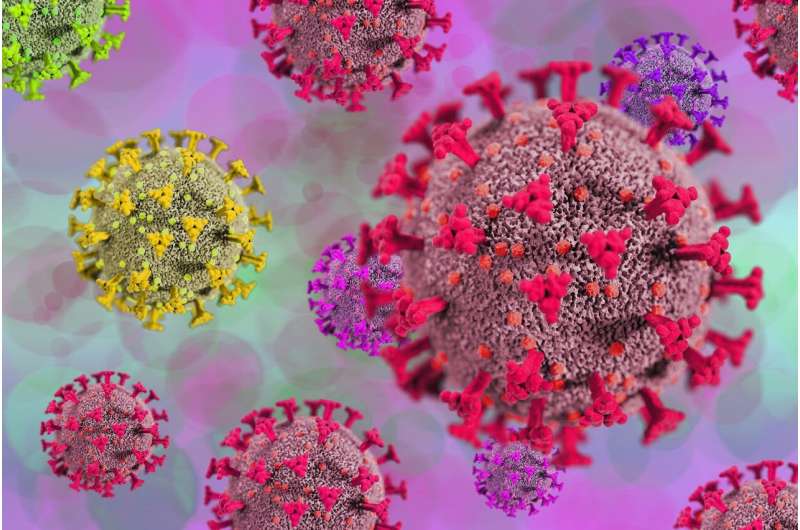This article has been reviewed according to Science X's editorial process and policies. Editors have highlighted the following attributes while ensuring the content's credibility:
fact-checked
trusted source
proofread
Q&A: Understanding the latest COVID-19 variants and vaccines

As COVID-related hospitalizations once again increase across the U.S., experts are researching the newly identified variants, their transmissibility and possible mutations. How concerned should the public be about these new variants? What is a good time to get fall vaccines? Can we expect the reinstitution of mask and social distancing regulations?
Jodie Guest, Ph.D., professor and senior vice chair of the department of epidemiology at Emory's Rollins School of Public Health, teamed up with Carlos del Rio, MD, distinguished professor of medicine, epidemiology and global health, interim dean of Emory University School of Medicine and interim chief academic officer at Emory Health care, to answer these questions and more.
Q: To what do you attribute the recent increase in COVID-19 hospitalizations and deaths?
A: Unfortunately, the vaccination coverage in the U.S. is not ideal. If you look who has been vaccinated with the last booster, it is only about 16% of the U.S. population and it's only about 46% of those people over the age of 65. The target should be, how we get people over the age of 65 vaccinated because those are the people we are seeing hospitalized.
Q: On Wednesday, the CDC issued its initial risk assessment for the new BA.2.86 variant, which says existing tests, treatments and updated vaccines will likely still be effective, but it "may be more capable of causing infection in people who have previously had COVID-19 or who have received COVID-19 vaccines." What does this mean?
A: What is different about this variant is that it has more than 30 (mutations) than the previous variant that was circulating. This is about equivalent to what the initial omicron variant was compared to the delta variant. And if you remember, we saw a massive increase in cases with omicron.
So what people are very concerned about is what is going to happen if this variant is that different. Are we not going to have enough immunity to prevent people from getting infected? But the good news is that it appears the existing treatment and testing work, and that the updated booster, which should hopefully come out in a few weeks, does appear to have some level of immunity and should continue to have significant protection against hospitalization, severe disease and death. This again emphasizes why (being up to date on vaccines) is so important.
Q: The new vaccines are due out in September and should be widely available in October. Considering the current rise in COVID-19 cases, should people get the booster that is currently available or wait for the updated booster?
A: If you have been vaccinated previously, the recommendation is to wait until this new vaccine is available. If you have not been vaccinated previously, then you could get vaccinated now and get that initial vaccine dose.
Q: Do you feel comfortable getting the seasonal flu shot and the updated COVID vaccine at the same time this year?
A: Yes, and I would also feel comfortable getting the RSV vaccine. The reality is that we now have vaccines against those respiratory viruses and for people over the age of 60—who are at high risk of hospitalization and death—that would be a good thing to do. Many of us are expecting what we've seen in the past, which is an early RSV wave, followed by a flu wave and finishing off with a COVID-19 wave. So we're going to see those viruses close circulating on our community and if you're over the age of 60, you want to avoid them.
Q: Some people are calling for the return of masks. Do you suspect that we will see an increase in the use of masks or a mandate for masking?
A: I don't think we're going to see mandates for masking anymore. But masking works, especially if you use the right mask. So, this is where I think people have to make their own risk assessment, especially if they are over the age 60 or have some health issues.




















